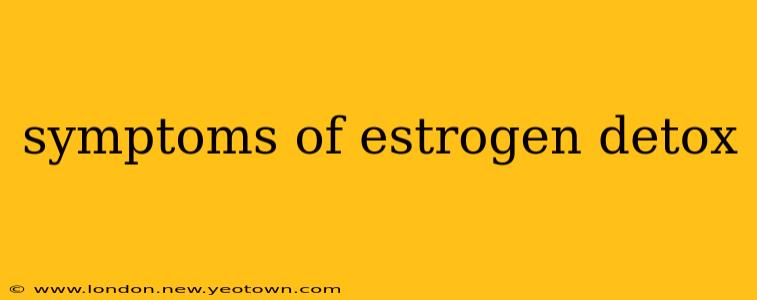The human body is a complex orchestra, and hormones are its conductors. Estrogen, a primary female sex hormone, plays a crucial role in everything from menstruation and reproduction to bone health and mood regulation. When the body tries to eliminate excess estrogen – a process sometimes referred to as "estrogen detox" – it can trigger a range of symptoms. It's important to understand that the term "estrogen detox" isn't a medically recognized term, and a true medical detox is not usually necessary. Instead, it refers to the body's natural processes of eliminating excess estrogen or supporting the liver in that process. This process can be supported through lifestyle changes and, in some cases, medical intervention.
What Exactly Happens During Estrogen Detox?
Imagine your liver as a diligent janitor, constantly cleaning up the body's waste. Estrogen, after completing its tasks, needs to be properly broken down and eliminated. When the liver's efficiency falters, or when estrogen levels become excessively high, the body may experience a cascade of symptoms. This isn't a sudden, dramatic event; rather, it's a gradual process that might manifest subtly at first.
Common Symptoms of Estrogen Dominance (and Potential Detox Symptoms)
Many of the symptoms associated with what some describe as "estrogen detox" actually stem from estrogen dominance – a state where estrogen levels are excessively high relative to progesterone. These symptoms aren’t necessarily indicative of a detox process but rather of an imbalance that the body may be trying to correct. These symptoms can include:
- Weight Gain, particularly around the hips and thighs: Estrogen influences fat storage, and high levels can lead to increased weight gain in specific areas.
- Bloating and Water Retention: Estrogen's impact on fluid balance can contribute to bloating and puffiness.
- Breast Tenderness: Fluctuating hormone levels can make breasts sensitive and tender.
- Mood Swings and Irritability: Hormonal imbalances are strongly linked to emotional volatility.
- Fatigue and Low Energy: The body may struggle to maintain energy levels when hormone regulation is disrupted.
- Headaches and Migraines: Hormonal changes can trigger or worsen headaches.
- Skin Issues (Acne, rashes): Estrogen plays a role in sebum production, and imbalances can affect skin clarity.
- Menstrual Irregularities: Heavy bleeding, prolonged periods, or irregular cycles are common signs.
- Sleep Disturbances: Hormones significantly impact sleep patterns, and imbalances can lead to insomnia or restless sleep.
How Can I Support My Body's Natural Estrogen Elimination Processes?
It's crucial to remember that there's no quick fix for hormonal imbalances. Instead, focusing on lifestyle changes that support liver function and overall well-being is key.
Supporting Liver Function
What are some ways to support liver function? A healthy liver is essential for processing and eliminating hormones. Prioritizing liver support is often a cornerstone of strategies aimed at managing estrogen levels. This can be done through:
- Eating a balanced diet: Focus on whole foods, fruits, vegetables, and lean proteins. Limit processed foods, sugary drinks, and excessive alcohol.
- Regular exercise: Physical activity boosts overall health and liver function.
- Adequate hydration: Drinking plenty of water is crucial for detoxification.
- Stress management: Chronic stress can negatively impact hormone balance.
Other Important Considerations
What role does diet play in estrogen detoxification? Dietary choices play a significant role. Cruciferous vegetables (broccoli, cauliflower, Brussels sprouts) contain compounds that help the body process estrogen. Foods rich in fiber aid in elimination.
Are there specific supplements that can help with estrogen detoxification? While some supplements claim to support estrogen metabolism (e.g., DIM, milk thistle), it's crucial to consult a healthcare professional before taking any supplements. Self-treating can be risky.
When should I seek professional medical help? If you experience persistent or severe symptoms, it's essential to consult a doctor or healthcare provider. They can perform tests to assess your hormone levels and provide personalized guidance.
Conclusion: The Path to Hormonal Harmony
Navigating hormonal changes can be challenging. While the term "estrogen detox" is often used in a broader context, focusing on supporting your body's natural processes through a healthy lifestyle, and seeking professional advice when necessary, is a crucial step toward achieving hormonal balance and improving overall well-being. Remember that this isn't about a rapid "detox," but a commitment to long-term health and wellness.

